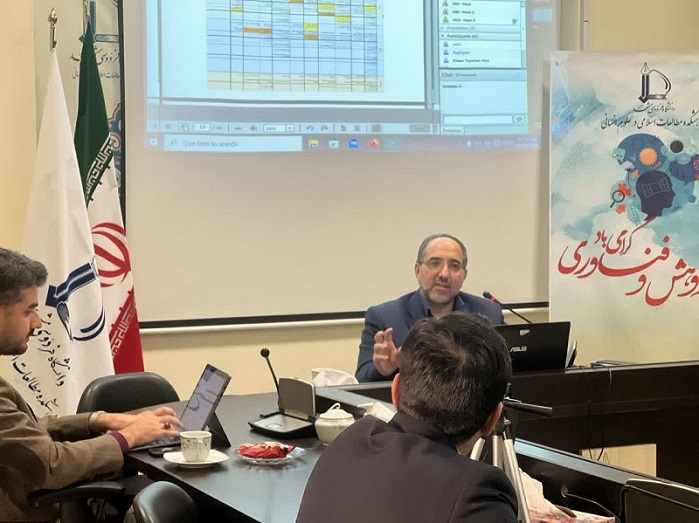Development and expansion of organizational intelligence is one of the strategies to overcome the crisis of efficiency and inefficiency in Mashhad municipality.

The 5th specialized meetings of Research and Technology Week 2022, the Research Institute of Islamic Studies in Humanities of Ferdowsi University of Mashhad entitled "Recognizing the causes and consequences of the inefficiency of the Mashhad Municipal Organization and transformative turns" lectured by Dr. Hossein Afkhami Rouhani, the head of the Research Institute of Islamic Studies in Humanities, Ferdowsi University Mashhad, on Sunday, December 18, 2022, was held face-to-face and virtually.
At the beginning of meeting, Dr. Afkhami stated that the topic of the meeting is the output of a research conducted with the support of the Program, Budget and Performance Evaluation Office of Mashhad Municipality, and said: The main problem identified by this research was that the Mashhad city is run expensively and administrative and financial issues have caused various problems, and the main issues of urban life have not been resolved. With the continuation of this process, the Mashhad municipal organization will face various problems.
He added: Hence, the following questions were raised: what is the way out of these challenges and reducing the problems? By correcting which key issue, will we see a significant reduction in problems? And what is the most important reason for the ineffectiveness of the municipal organization from elites and experts’ viewpoint?
Referring to the challenges of the Mashhad municipal organization, the head of the Research Institute of Islamic Studies in the Humanities of Ferdowsi University of Mashhad noted: lack of optimal use of municipal capacities, lack of necessary participation in urban management by natural and juridical persons, lack of sufficient attention to information and awareness-raising based on the rights of the parties in the municipality, the unfair and rapid expansion of the city's surroundings, the problems of urban transportation planning, the lack of attention to the historical and cultural identity of Mashhad Al-Reza (AS), the weak interaction and cooperation of the municipality and other organizations, the lack of attention to the decentralization approach (neighborhood-oriented), the lack of the trust of citizens and investors towards the municipal organization and the inefficiency of work and organizational processes, along with the lack of necessary comprehensiveness of the planning system, are a number of the organizational challenges of Mashhad Municipality.
Referring to the strategy of moving from urban management to urban governance from elites’ perspective, Dr. Afkhami stated that according to the opinion of the elites in this research, in order to solve the identified challenges, the important indicators of governance extracted from the elites' view, including justice-oriented, attention to Razavi's identity, and transparency, should be taken into consideration.
He added: In this study, by categorizing the major problems, 3 major problems of politicization, weak organizational culture, and weak knowledge and experience of employees and contractors were identified.
Mentioning politicization as the root cause of troubles, he expressed: "In politicization, the criterion of competence is removed and political considerations are taken into account." A competent governance has an important relationship with efficiency, and efficiency results in great effectiveness. Politicization has administrative and political consequences, including the learning crisis, the efficiency crisis, and the creation of bureaucratic discord in the organization.
He also remarked: Managers' activities should be based on the goals of the organization, people should not pretend to raise their rank, and managers should seek people's satisfaction. Long-term goals should be taken into consideration and decisions should not be made based on results.
Then, Dr. Afkhami discussed the identified solutions to overcome the organizational consequences of politicization and said: avoiding demagoguery, change in the incentive system, education and general awareness of citizens about their rights, adaptation of the organization's policy and the method of measuring the degree of adaptation, adaptation of results to programs, considering individuals’ expertise and competence criteria, expansion of professional ethics and serious attention to its document, attention to public evaluations, revision of organizational success criteria, selection of competent people based on detailed career path, establishment of a comprehensive project management system, establishment of a comprehensive system of urban infrastructure maintenance, establishment of a meritocracy system and the talent management system, serious attention to organizational transparency, and the use of intelligence and the development and expansion of organizational intelligence are among these solutions.
In the continuation of the meeting, a question-answer session was held with the audience.

